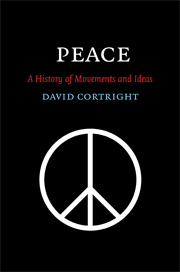11 - Democracy
Published online by Cambridge University Press: 05 June 2012
Summary
The rise of peace advocacy in the nineteenth century grew out of the theories of political liberalism and the Enlightenment belief in human perfectibility and social progress. Philosophers and economists of the eighteenth and nineteenth centuries believed that the spread of democracy and free trade would incline nations toward cooperation and peace. War would disappear, they claimed, when the ancient regime was replaced by the rising commercial middle class. Once people were liberated from the shackles of the past, the tyranny of privilege and prejudice would be replaced by what Thomas Jefferson termed “an aristocracy of talent and virtue.” War would be banished as an outdated anachronism of the old order, or so it was assumed.
In this chapter I examine the relationship between democracy and peace and probe the theoretical and empirical linkages between the two. Democracy is by definition a process in which citizens freely exercise their political rights and reconcile interests without resort to violence. The spread of democracy extends the arena of human affairs in which disputes are settled without violence. It establishes conditions that foster political cooperation. Nonviolence “is written into liberalism's genetic code,” wrote Jonathan Schell. “In this basic respect, the long march of liberal democracy is a ‘peace movement’ – possibly the most important and successful of them all.”
My survey begins with a review of Enlightenment thinking and an examination of the theory of democracy and free trade as articulated by Richard Cobden and others.
Information
- Type
- Chapter
- Information
- PeaceA History of Movements and Ideas, pp. 233 - 259Publisher: Cambridge University PressPrint publication year: 2008
